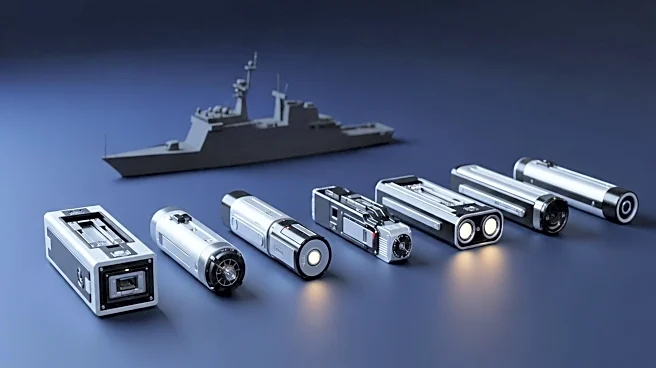What's Happening?
Kongsberg Maritime has entered into a contract with Turkish shipbuilder STM to provide fuelling-at-sea (FAS) and replenishment-at-sea (RAS) equipment for the Portuguese Navy's upcoming replenishment ships. These ships, measuring 137 meters in length, are set to be delivered in 2028 and 2029. The contract marks Türkiye's first military ship export to a European Union and NATO member state. The ships will have a full load displacement of 11,000 tonnes and will be equipped with two RAS stations. They will be capable of carrying significant quantities of fuel, fresh water, and cargo, and will also support command-and-control, medical, amphibious operations, humanitarian assistance, and search and rescue missions.
Why It's Important?
This development is significant as it enhances the Portuguese Navy's operational capabilities, allowing for extended missions and improved logistical support. The contract also represents a milestone for Türkiye in expanding its defense exports to NATO countries, potentially opening doors for future collaborations. For Kongsberg Maritime, this contract reinforces its position as a leading supplier of naval replenishment technology, having previously equipped various international naval platforms, including those of the UK Royal Navy and the Indian Navy. The deal underscores the strategic importance of replenishment ships in modern naval operations, providing essential support for sustained maritime presence.
What's Next?
The Portuguese Navy is expected to integrate these replenishment ships into its fleet by 2028 and 2029, enhancing its maritime operational capabilities. As the ships are equipped with advanced replenishment systems, they will likely play a crucial role in NATO's maritime strategy, particularly in the Atlantic region. The successful delivery and integration of these ships could lead to further defense collaborations between Türkiye and other NATO member states, potentially expanding Türkiye's footprint in the European defense market.
Beyond the Headlines
The contract highlights the growing importance of international defense collaborations and the role of technology in modern naval operations. It also reflects the strategic shifts in defense procurement, with countries seeking advanced capabilities to support diverse missions, including humanitarian and rescue operations. The deal may influence other NATO countries to consider similar partnerships, fostering innovation and technological exchange within the alliance.









